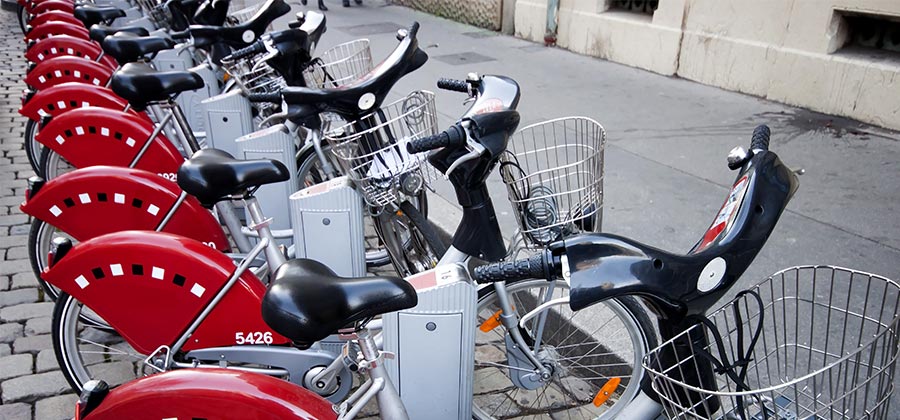The health and economic crisis has affected all aspects of every sector. Among them, mobility, for both private individuals and for companies.

Mobility is evolving every day. And it has been driven further as a result of the coronavirus crisis. Many people have been locked down and working from home has been widespread in many parts of the world.
The coronavirus crisis has changed concerns about transport
We are no longer moving around in the same way. And concerns are no longer the same. According to a BCG Consulting report, social distancing and vehicle cleanliness are the most important aspects for 41% and 39% of respondents, respectively, when choosing a mode of transport. There is also pre- and post-Covid mobility, with respondents being more likely to choose walking, their own bicycle or scooter, or their car than before the crisis.
Sustainable and alternative mobility in the years to come
Mobility has not necessarily waited for the coronavirus crisis in order to evolve. And, according to the same report, the share of more environmentally-friendly vehicles will continue to increase. By 2035, more than 35% of new vehicles will be electric cars, becoming the predominant form of motorised transport worldwide. Autonomous cars will also become more common, with 10% of vehicles being level 4 vehicles (able to travel without a driver, for example), and 65% level 2 or higher.
Customised mobility for employees, right now
The future of mobility is also relevant now, especially for businesses and the self-employed. The need for alternative modes of transport does not only concern private individuals, but also employees. There is no longer a single mode of transport for all situations, but a range of means depending on the need at a given moment. Electric cars, hybrid vehicles, electric bicycles, a public transport season ticket, car sharing, leasing, etc. These modes can take different forms and be combined in a mobility card, for example. There are benefits for the employees and managers of a company but also for the company itself through cost reduction, optimisation and fleet management.
Find out more about our tailor-made mobility solutions
28.01.2021
The road to alternative mobility
Nowadays, responsible fleet management is built around sustainability. We're here to help you identify and realise your Corporate Social Responsibility ambitions.
Together we can cut your company's carbon footprint, improve employee mobility, and make sure these steps become a central pillar of your company's added value. In short, our aim is to have an alternative mobility policy.
Energy transition
We can help you make the switch to alternative mobility and new technologies to reduce your carbon footprint. Our SMaRT approach ensures your fleet has the best energy mix to match your strategy and driver profiles.
Alternative mobility needs new technologies to go hand in hand with new infrastructure. That's why we offer not only electric cars, but also the right charging solutions, too. As part of our integrated service provision we can determine how many charging points you need, install them, and manage how they are used both at the workplace and at the driver's home.
Soft mobility
Modern mobility management is about more than just cars or vans. You need a 360-degree approach. We'll work with you to determine your mobility strategy and needs. Greener cars are just one of the options available. We have a number of mobility management solutions (such as the Mobility Card) and alternative mobility solutions (such as bicycle leasing) to inspire your organisation to offer a more flexible range.
Focus on employees
When you put your employees at the heart of your organisation, you're in a better position to find skilled employees, satisfy them, and retain them. Go a step further than just an alternative mobility solution: focus on their safety and let them play an active role in achieving your sustainability goals. Trust us to improve their safety and integrate new technologies.
Operational leasing is offered by Arval Belgium SA/NV, with the intervention of BNP Paribas Fortis SA/NV – Montagne du Parc/Warandeberg 3, B-1000 Brussels, Brussels Register of Companies VAT BE0403.199.702.
Promotion only available from Thursday 21 January up to and including Wednesday 31 March 2021 and is only available to professional clients (self-employed, liberal professionals and SMEs) of BNP Paribas Fortis and Fintro.
The information provided here does not constitute an offer. An offer is made only after your file has been accepted and is always subject to Arval Belgium SA/NV's General Terms and Conditions.
27.01.2021
Mobility, more than just four wheels
BNP Paribas Fortis offers complete mobility solutions. Sometimes a four-wheeled fleet is not enough for your mobility needs.

As a reliable partner, we can help you with every step – or pedal – of your mobility trajectory.
Mobility analysis and advice
Our mobility managers can work together with your relationship manager to develop a future-focused mobility strategy.
We start by listening to you: we want to understand your needs and concerns when it comes to mobility. This is our starting point for creating the best mobility solution for you and your company. We will build on this foundation with our expertise, while also taking Belgium's specific legal and fiscal ecosystem into account.
New mobility solutions
As well asfull-service leasing,we also offer our core product giving you access to our full mobility range, a wide range of basic services and added-value services such ascar parts,carpool management,bicycle leasingandmobility cards. All of our mobility services and their associated services such as parking, electric charging, fuel, tolls and car washing are within reach.
Managing your mobility budget
We'll help you and offer advice about implementing the federal mobility budget[VBK1] in your company. If that's too limited to meet your specific needs and aims, we can develop a personalised mobility budget solution to manage your mobility costs in line with the legal framework, just as we've done for a number of clients previously.
We've already implemented some tailored cost-neutral solutions, allowing our clients to combine lease cars with lease bicycles or other mobility solutions. This means the company can meet its goals while also making good on its promises and obligations.
Those ambitions might range from an ambitious CO2 agenda to a competitive offer to attract talent or a solution to solve your lack of car parking spaces.
Operational leasing is offered by Arval Belgium SA/NV, with the intervention of BNP Paribas Fortis SA/NV – Montagne du Parc/Warandeberg 3, B-1000 Brussels, Brussels Register of Companies VAT BE0403.199.702.
Promotion only available from Thursday 21 January up to and including Wednesday 31 March 2021 and is only available to professional clients (self-employed, liberal professionals and SMEs) of BNP Paribas Fortis and Fintro.
The information provided here does not constitute an offer. An offer is made only after your file has been accepted and is always subject to Arval Belgium SA/NV's General Terms and Conditions.
20.12.2024
Mobility in 2025: Arval’s view
Laurent Mélignon, Corporate Sales Director of Arval, the market leader in full-service car leasing and new mobility solutions, looks ahead to 2025. What does the future hold for the industry and mobility?
Arval is part of the Commercial, Personal Banking & Services division of the BNP Paribas Group. As the market leader, it plays a key role in offering full-service car leasing and new mobility solutions. Laurent Mélignon, Corporate Sales Director of Arval, is thus ideally placed to share his thoughts on what's in store for Arval in 2025.
Arval is the market leader in a sector in flux: how companies and private individuals see and approach mobility has changed significantly. Mélignon sees several reasons for this: "In our country, taxation is the primary driver of many change processes. This taxation is linked to wage costs: many companies see company cars as a tax-friendly alternative for maximising the remuneration they want to pay their staff. Employees, meanwhile, see company cars as a way to be compensated with tangible benefits, without the tax authorities targeting them. In the coming year, the tax framework will continue to evolve in line with this social evolution. The federal mobility budget and the bicycle allowance, for example, or options such as the cafeteria plan or the flex income plan: these are just some of the ways in which companies can use their salary package to motivate their workers."
But Arval's Corporate Sales Director sees even more drivers of change for mobility. Mélignon: "Our entire mobility culture is also changing, a trend that is set to continue in 2025. The younger generation is much less attached to the status that company cars have been associated with for so many years. They are just as happy to hop on a bicycle, take the bus or use car sharing, depending on the company's location, of course. Finally, there are also several macroeconomic factors driving this change. These include the growing traffic crisis many cities are facing, as well as the increasing awareness of people and economic players regarding the energy transition. We are all gradually seeing the need for change and alternative mobility choices. This has been clear for quite some time."
Flexible complexity
The mobility mix will only become stronger in the future. Mélignon: "That is a big part of our mission: to be and remain a one-stop shop, offering companies the opportunity to think in terms of flexible remuneration. A new employee, for example, someone who is single and without a family, has different mobility needs than their colleague, who is married with two children and has their own home in the countryside or in the city. Now that this need is becoming stronger and more established, Arval is the ideal partner to provide companies with knowledge about mobility and take the burden off their hands. We enable employers to offer flexibility by taking care of the complexity associated with it."
Positive mindset
Mélignon expects the transition to electric mobility to continue in 2025: "When I look at corporate customers, I see that 80% of all new orders are electric. This is quite different from the private market, where we barely reach 20%. The electrification of the Belgian fleet is therefore mainly driven by companies. I see that the government has recently made some announcements and initiatives to slightly adjust and refine the federal mobility budget. In the coming months, more and more people may thus give up their company cars and opt for this adjusted budget instead. Arval can also be of service there, with a positive mindset and a lot of know-how, in our role as a 'full mobility provider'."
Tipping point
According to Mélignon, the shift to electric mobility, which the market has been anticipating for so long, will also have consequences for companies. Mélignon: "We expect to see many more affordable models in 2025. Electric vehicles will no longer be just for the lucky few. This benefits the private market, but it also gives companies more opportunities. In addition, I expect the price of cars with combustion engines to rise. We often receive this feedback from manufacturers. As a result of the Corporate Average Fuel Economy (CAFE) standards, which regulate their CO2 emissions, they will soon have to pay huge fines if they fail to meet these standards. It is therefore in their interest to steer the market towards electric cars. They will also adjust their production capacity accordingly: 'made to order' instead of holding large stocks will become the industry standard from next year."
The road ahead
On a final note, Arval expects the market to open up to smaller and medium-sized enterprises and individual clients in the near future. Mélignon: "We believe that the change in the market will mean that many companies, which currently still favour purchasing company cars or financial leasing, will switch to operational leasing. They will outsource the risk related to, for example, residual value to us. And that is where we can make a difference as the market leader: we see this as a scenario for the near future, for which we are already preparing."
16.12.2024
The digital divide persists
“It's not just the elderly who lack digital skills, young people and workers are also affected,” says Linde Verheyden, Director Public Affairs at BNP Paribas Fortis and Chair of DigitAll.

Despite the acceleration in digitalisation, many people are being left behind. In Belgium, 40% of the population between the ages of 16 and 74 are at risk of digital exclusion. Although older people are often seen as the most vulnerable group, younger people are also struggling in the digital age. Among young people aged between 16 and 24, almost a third lack basic digital skills, with a peak of 52% among those with a low educational attainment.
Figures that are surprising to say the least, considering young people grow up surrounded by digital tools.
"People often assume that young people are digital natives because they are adept at using social media. But making a TikTok video or scrolling through your Instagram feed doesn't necessarily mean you know how to carry out online banking transactions or complete an application form.
Does poverty play a significant role in the digital divide?
"Absolutely. For 25% of people living in poverty, a smartphone is their only digital device. Although they provide a basic form of access, smartphones are often inadequate for important tasks such as preparing a CV or filing a tax return. Without a computer or a stable internet connection, many digital opportunities remain out of reach for those who don't have access to these tools.
What are the other reasons for this digital divide?
"People often lack the necessary basic digital skills because they never learned them. They may not know how to use a search engine, attach a file to an e-mail, or download an app. Without this knowledge, the digital world becomes inaccessible. Furthermore, there is also the issue of digital stress. Many people worry about making mistakes, being hacked, or their privacy. Some people deliberately choose not to use digital services even though they have the skills. Technology instils a sense of distrust and unrest in them, creating a significant barrier.”
How can companies help close this gap?
"Companies can play a key role on several levels. In addition to being a social problem, digital exclusion is also an economic challenge. Today, less digitally adept individuals are both customers and potential employees. Being aware of this as a company is the most important first step. But it’s also essential to provide support to your staff. For example, employees at the municipal parks and greenery service in Ghent received training on how to file their tax returns online. These kinds of initiatives give people practical skills and confidence. In addition, companies need to do a digital check. To measure is to know. Just because someone uses a laptop daily, it doesn’t mean they have digital skills."
What does BNP Paribas Fortis do specifically to promote digital inclusion?
"We have launched several initiatives. In 2020, we established DigitAll, a platform for sharing knowledge and best practices around digital inclusion. Today, we bring together more than 130 organisations. DigitAll has developed a range of tools, including a checklist that companies can use to test how accessible their apps and websites are. A simple interface can make the difference between joining or dropping out for people who are less digitally adept. Since 2021, the bank has also supported a chair at the VUB that investigates the link between digital inclusion and human rights."
How important are tools in bridging the digital divide?
"User-friendly tools are a must. We have partnered with Emporia, a manufacturer of user-friendly smartphones for the less digitally adept. We pre-install our app for customers who buy one of their smartphones."
We mentioned digital stress earlier. How can you mitigate this?
"With awareness campaigns. We want our customers to use our tools with confidence. The bank also takes its less digitally adept customers into account. Thanks to our partnership with bpost, all our customers can go to their local post office for all basic banking transactions."
Do companies stand to benefit from promoting digital inclusion?
"They do. Digital inclusion requires a sustained effort from all stakeholders, including governments and educational institutions. No one should be left behind. Companies that act now can contribute to a more inclusive society while also securing their own future in an increasingly digital world.”
“Without key digital skills, many digital opportunities remain out of reach.”
“A simple interface can make the difference between joining or dropping out for people who are less digitally adept.”
“Limited digital skills remain an obstacle to closing the digital divide.”
Linde Verheyden, Director Public Affairs at BNP Paribas Fortis and Chairman of DigitAll
